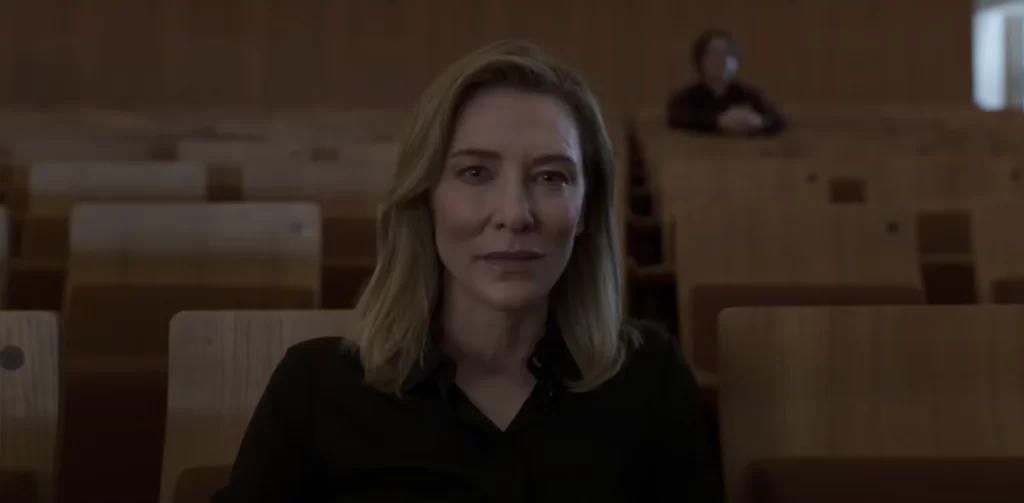
Cate Blanchett is a titan. Whether playing a British monarch or an American actress or an elven queen, she emanates an unimpeachable authority, an innate rightness. Yet in some of her nerviest performances—as an abusive teacher in Notes on a Scandal, as a fallen socialite in Blue Jasmine, as a yearning lover in Carol—she chips away at this invincibility, hinting at desire and pain without showing any visible cracks or weakness. So Blanchett’s casting as the titular anti-heroine of Tár, the gripping new drama from Todd Field, is almost too perfect. She—by which I mean both Blanchett and Lydia, the character whose surname gives the film its title—is an avatar of supremacy, and the movie begins as a chronicle of her dominance before it gradually turns into… something else. Field reportedly wrote the script specifically for Blanchett, and he’s been rewarded. It’s not that you can’t imagine anyone else playing Lydia (Nicole Kidman? Rebecca Hall?); it’s that if you dared to suggest a different actor, Lydia would eat you for lunch.
That fluid lethality—the combination of cultured intelligence and formidable omnipotence—might not seem obvious from Lydia’s profession, though perhaps that gives short shrift to the cutthroat modern world of classical music. We first meet her at a festival interview conducted by The New Yorker’s Adam Gopnik, a conversation that Field presents in multiple ways. Initially, as Gopnik’s voiceover informs us of Lydia’s estimable accomplishments—among other things, she’s won the EGOT, and she runs a fellowship that has nurtured numerous female composers (including Hildur Guðnadóttir, who provides the actual score here)—the screen provides a brisk montage, with a blizzard of crisp images (such as the precise tailoring of a suit) that evoke the specter of careerism. Field then brings us inside the auditorium and spends several minutes simply observing Lydia and Gopnik’s discussion, a curious choice that later proves to be a sly bit of misdirection.
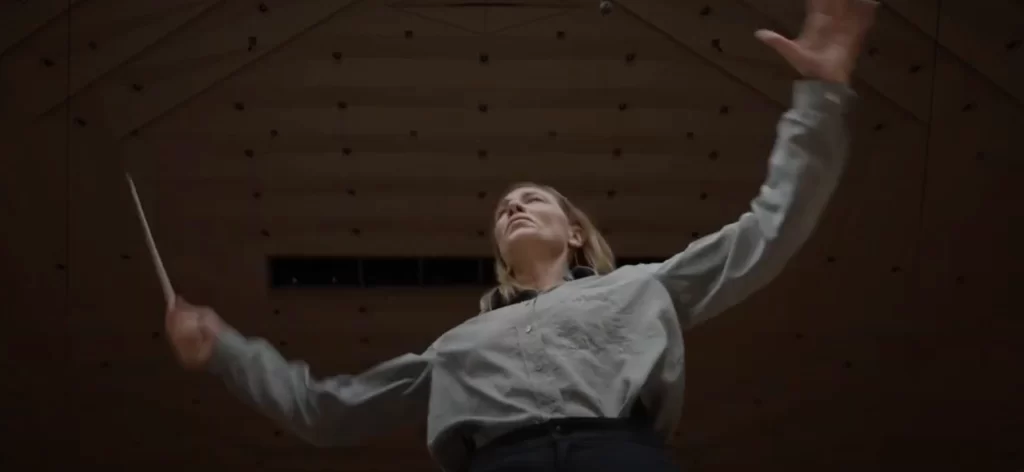
This leisurely opening chat, with its erudite language and intellectual subject matter—at one point, Lydia enlightens us on the philosophy of Leonard Bernstein, whom she refers to as “Lenny”—carries the whiff of a so-called “eat your vegetables” picture. The festival’s audience, which raptly follows Lydia’s every word and mumbles appreciatively at her insights, might be a first-world mirror for those of us who bought our own tickets, and who have the privilege of watching gifted artists demonstrate the contours of their craft. (Furthering this parallel, the movie premiered at the Venice Film Festival, where Blanchett won Best Actress.) But while Tár is unapologetically rigorous, it is not pretentious or—to use a word that most critics wield as an insult, but which I tend to deploy as a compliment—middlebrow. Instead, it stealthily assumes the form of a psychological thriller—a desperate race to stop an inexorable outcome—and it’s embellished by the trappings of a horror movie.
That comes later, though Field and Blanchett waste little time establishing Lydia’s supple yet flinty persona. Shortly after that flattering New Yorker appearance, she guest-teaches a class at Juilliard, where she clashes with an aspiring conductor named Max (Zethphan Smith-Gneist). Shocked to learn that her new pupil, who is BIPOC pangender, disdains the work of Bach on account of his lecherous habits, Lydia proceeds to humiliate Max, eviscerating their self-seclusion as the product of identity politics and insisting that crusty old white men could be great artists too. Her argument is perfectly valid, but she expresses it with a blitheness that’s hostile, even predatory; this casual intensity is only amplified by the way Field shoots the scene, delivering an unbroken take that smoothly tracks Lydia strolling around the classroom (at one point, she plays a bit of Bach on piano, which Blanchett performed herself), refusing to give the audience any respite. “You’re a fucking bitch,” Max spits as they storm out. It’s an overreaction. It is also an assessment which is, as Tár goes on to reveal, not wrong.
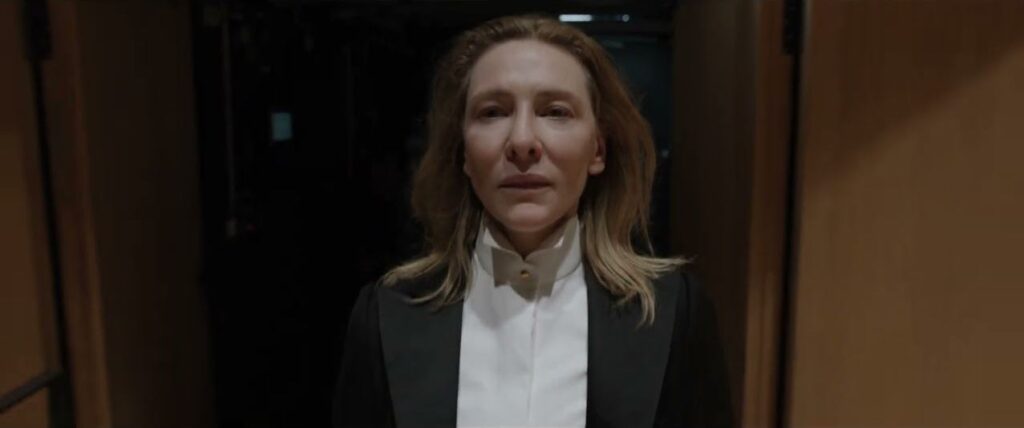
I’m not sure that even Lydia disagrees. She seems to take pleasure in flaunting her arrogance, and in demolishing gender norms as a way of cementing her own primacy. “I’m Petra’s father,” she whispers to a wide-eyed schoolgirl who’s been bullying her young daughter, and who will probably spend years in therapy traumatized by this towering ogre of a woman who threatens to “get her.” That sense of swaggering might applies to her interactions with adults as well, whether she’s swiping a pen off a colleague’s desk or dismissing an assistant conductor for his frailty or ordering a beleaguered assistant (Noémie Merlant, from Portrait of a Lady on Fire) to delete incriminating emails.
The last of those proves crucial to the plot of Tár, which initially finds Lydia reaching a career pinnacle—she’s completing the last of nine live recordings of Mahler’s symphonies with the Berlin Philharmonic—before tracing her long, hard fall from the podium. It’s possible to judge this storyline as schematic—a strained synthesis of cancel-culture protesting, social-media mobilizing, and #MeToo turmoil. But Field’s filmmaking is too urgent and enveloping to become mired in didacticism or politics. He charts Lydia’s descent into paranoia and exile with meticulousness and invention, imagining her as the villain in her own nightmare. The movie’s sound design is especially impressive, taking prominence as Lydia repeatedly finds herself haunted in the black of night by objects as mundane as a beeping refrigerator and a clacking metronome.
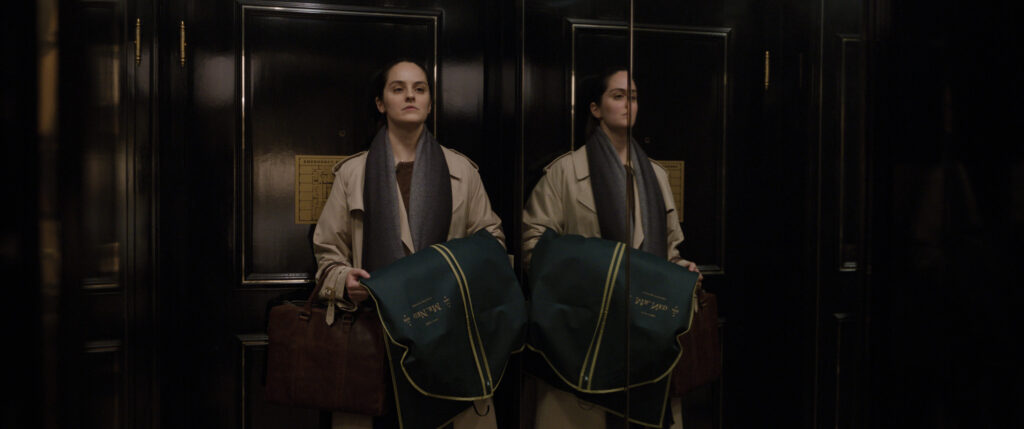
Yet despite its foreboding tone and descendant trajectory, Tár also finds pleasure in exploring Lydia’s artistic process. The film is steeped in classical-music minutiae—there are discussions of noise dynamics and companion pieces and rating sheets—but its verisimilitude never feels intimidating. Instead, much like the rehearsal sequences in Drive My Car, the scenes of Lydia collaborating with her orchestra thrum with liveliness and discovery. For all her faults—and she has a great many faults—Lydia is plainly a prodigious musical talent, and Field eagerly delves into the eccentricities of her work.
Of course, the comparisons between Lydia and Bach prove relevant in more ways than one. Tár fuses the professional and the personal with the introduction of Olga (Sophie Kauer, in her first role), a beautiful Russian cellist whom Lydia glimpses before we do; all we see at first is the flush of color that flares on Lydia’s cheeks, followed by a quick peek under a bathroom stall at a fetching pair of boots. The subsequent sequence in which Lydia plucks Olga for her string ensemble after a purportedly blind audition is a masterful piece of choreography—a brilliant symphony of searching glances, offhand comments, and doctored notes. Throughout, Field (making his first feature in 16 years, following the extraordinary one-two punch of In the Bedroom and Little Children) continues to sprinkle in subtle bits of visual storytelling, such as the pained, knowing grimace that flashes across the face of Lydia’s romantic and occupational partner (Nina Hoss, just right) when she learns that her boss and lover will be bypassing a seasoned cellist in favor of fresh, ripe blood.
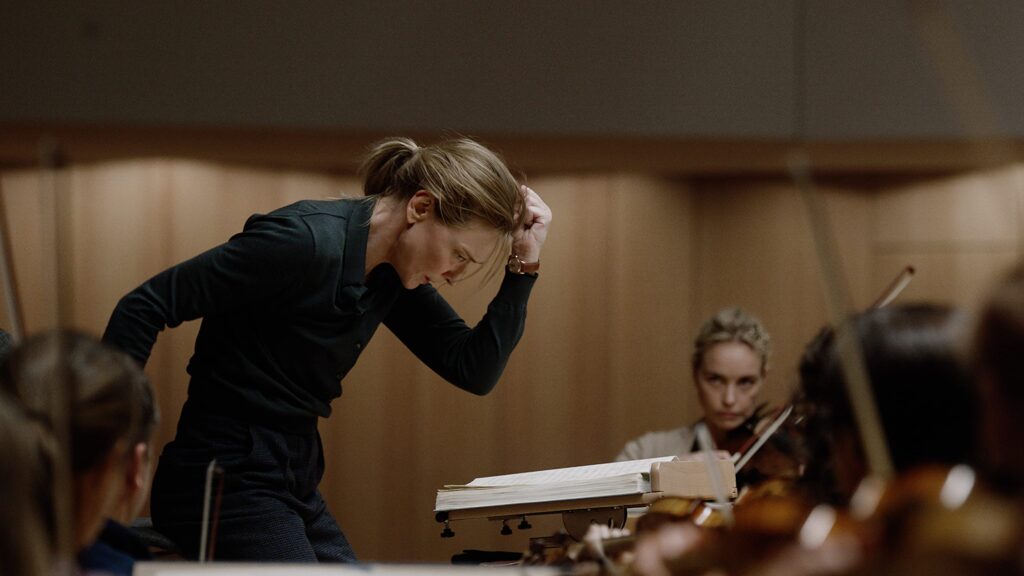
What transpires between Lydia and Olga? Maybe you can guess—it seems prophetic when Lydia discovers markings rearranging “Tár” into “rat,” even as she has already anagrammed a prior subordinate’s name (Krista) to “at risk”—but while the movie’s broad narrative arc is foreseeable, its details are spiky and surprising. You surely wouldn’t anticipate, for example, that at one point a pill-popping Lydia will stumble around her barren apartment screeching an off-key ditty called “Apartment for Sale,” which she plays on a woozy accordion. And the film’s final scenes (which follow a clever reveal regarding Lydia’s background) are genuinely haunting, most notably a visit to a massage parlor that silently gathers the force of a reckoning.
And even if Tár’s thematic messaging can be reductive, Blanchett’s colossal performance is irreducible. Lydia Tár is a giant, larger than life; she is also pathetic, and Blanchett captures the full shape of her sweaty humanity—her genius, her spite, her lust, her brutality—without ever straying into theatrics or sentimentality. Is Lydia’s inevitable comeuppance a vindication, or a tragedy? Either way, under Field’s savvy conducting and Blanchett’s nimble playing, it’s music to our ears.
Grade: A-
Jeremy Beck is the editor-in-chief of MovieManifesto. He watches more movies and television than he probably should.
